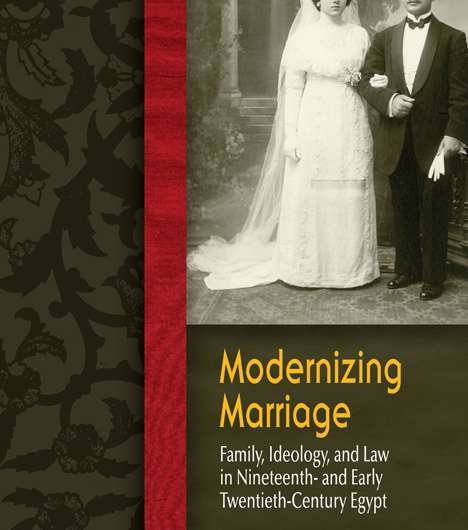Egypt historical study shows 'traditional' marriage more modern than we think

Mention traditional marriage and family and it's easy to think you're talking about age-old customs. Those "traditional" ideals and practices, however, are more likely a product of the last two centuries, says a University of Illinois history professor.
"You can't go back 50 or 100 years and say that that's the way it had been for centuries up to that point," says Kenneth Cuno. "Family ideals and practices have constantly changed in the past, and continue to do so."
Cuno teaches a course on the history of the family, taking in the last two centuries in various parts of the world. He also is a specialist on the Middle East, and the author of the recently published "Modernizing Marriage," which focuses on the reinvention of marriage and family in Egypt in the 19th and early 20th centuries.
"There is a popular notion out there of a traditional family arrangement, and people are constantly invoking it to talk about how things are just getting so much worse nowadays," Cuno said. "What I show in my book is that it's exactly the opposite in Egypt, that in fact they've come closer to approximating their own modern ideals of (traditional) family than in the past."
In Egypt, as in the U.S., modern ideas of traditional family focus on the nuclear or conjugal family, a marriage based on companionship and the nurturing of children, Cuno said.
In contrast, Egypt prior to the 1880s was a place where polygamy was common among rulers and the elite, harems often included slave women, and men could easily divorce their wives.
Getting from there to modern ideals and practices involved a process that began in the late 1800s and that Cuno traces in his book. The ideas were a hybrid of Islamic and Western, and promoted mostly by "modernist" intellectuals. Egypt's ruling class also set an example by publicly moving away from polygamy.
Those intellectuals "saw family stability as a social good, and something that would help the nation advance, because they understood the family as the site where future generations were produced," Cuno said. Therefore, they advocated monogamy and were extremely critical of easy divorce.
They also saw women as the principal influence on those future generations, and so advocated education for women as preparation for their roles as mothers and household managers, Cuno said. These intellectuals were not feminists, but by promoting an affirmative role for women in what they saw as a project of national advancement, they opened the door to greater access to education and work for women later on, he said.
Cuno stresses in the book that one size does not fit all in regard to marriage and family in modernizing societies.
"We should not expect Egypt or other non-Western societies to develop practices and ideals identical to ours, and should not judge them as somehow inferior because they fail to do so," he said. "We had different starting points, and our ideals and practices keep changing."
Egypt, for example, was heavily influenced by Western ideas in the 1800s about the value of marriage based on companionship and not just economic concerns, Cuno said.
Egyptians also have placed a premium on marital and family stability. They see marriage as a decision not just for individuals, but for parents and the larger families, he said. Most marriages are still arranged to some extent. Families try to assess the quality of the potential spouse and how well the couple will get along. Financial arrangements often are negotiated as a hedge against divorce.
"The attitude is that marriage is such an important life event that it cannot just be left up to some young, starry-eyed person to fall in love and make a rash decision on their own," Cuno said.
This, of course, is contrary to American individualism and American ideas about marriage, but under this system, Egypt's divorce rate declined dramatically in the second half of the 20th century, Cuno said. The chance that a married woman will be divorced is one-third of what it once was.
Even through several radical changes in government in recent years, Egyptians have demonstrated their general consensus on these ideals and practices, Cuno said. Through two new constitutions, one drafted under the Muslim Brotherhood, little changed regarding the ideology and law around marriage and family.
Provided by University of Illinois at Urbana-Champaign

















